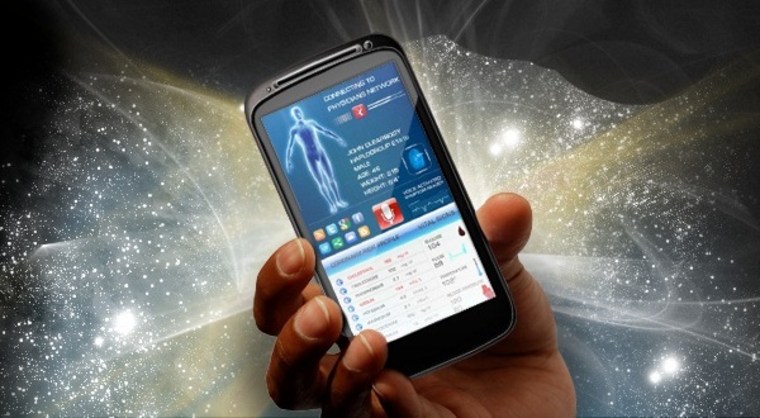Qualcomm and the X Prize Foundation have laid out a $10 million plan to spur the development of medical diagnosis devices like the ones seen on "Star Trek" science-fiction shows — not by the 23rd century, but by mid-2015.
The Qualcomm Tricorder X Prize is the latest multimillion-dollar competition designed to serve as an incentive for technological breakthroughs, following in the footsteps of X Prizes for private-sector spaceflight, ultra-efficient automobiles. low-cost genome sequencing and robotic moon missions.
"There is a generation of exponentially growing technologies ... that are coming together to empower us to make real the 'Star Trek' technology of a medical tricorder," Peter Diamandis, the X Prize Foundation's CEO, told me today.
Tricorders are the hand-held props that have been used by "Star Trek" characters dating back to the 1960s to check a crew member's vital signs — with the aim of keeping Bones from having to tell Captain Kirk, "He's dead, Jim." The old ones looked like cassette recorders with mini-TV screens, while the later models looked like flip phones gone wild.
The tricorder envisioned for the X Prize would be a hand-held wireless device like a smartphone, weighing no more than 5 pounds. It'll have to record health indicators such as blood pressure, respiratory rate, pulse and temperature, and diagnose a set of 15 diseases to be named later. Diamandis said the diseases on the list would probably include respiratory and cardiovascular conditions.
Details still to be determined
The X Prize specifications still have to be filled out, along with the scale to be used for judging the various models in the competition, but the foundation says "teams will have to consider tradeoffs amongst weight, functionality, power requirements, battery life, screen resolution, A.I. engine location, diagnosis capability, end consumer cost, and so on."
The schedule calls for the initial draft of the competition guidelines to be made public later this month, and massaged into their final form by September or so. The teams that seek the prize will show off their prototypes during a qualifying round in mid-2014, and the top 10 teams will compete in a final round in mid-2015. That final round will require teams to use their devices to diagnose 15 to 30 consumers over the course of three days. The teams will be judged based on the diagnoses as well an assessment of consumer experience and proof of adequate high-frequency data logging.
The top team will win $7 million, and there'll also be a $2 million second prize and a $1 million third prize, all put up by the Qualcomm Foundation.
"Health care today certainly falls far short of the vision portrayed in 'Star Trek,'" Paul Jacobs, who is Qualcomm's chairman and CEO as well as chair of the Qualcomm Foundation, said today in a news release. "By sponsoring the Qualcomm Tricorder X Prize competition, the Qualcomm Foundation will stimulate the imaginations of entrepreneurs, engineers, scientists and doctors to create wireless health services and technologies that improve lives, increase consumer access to health care and drive efficiencies in the health care system. This competition will accelerate the development of tools that can empower consumers to take charge of their own bodies and manage their own care."
The competition's formal kickoff came today during Jacobs' keynote address at the Consumer Electronics Show in Las Vegas. It follows up on last May's announcement that Qualcomm, a global company focusing on wireless network technology, would sponsor the competition.
Tricorders galore
Whether or not you call it a tricorder, the hand-held medical diagnostic device definitely seems to be an idea whose time has come. Just last month, the Canadian government and the Bill and Melinda Gates Foundation announced a $38.5 million initiative to further the development of such devices, as well as the medical tests and protocols that would run on them. Also last month, the U.S. Food and Drug Administration gave its approval to the first hand-held device to detect brain bleeding.
Meanwhile, a startup called Scanadu is working on a "tricorder" that parents can use to monitor their kids' health, and there are so many medical monitoring apps for smartphones that the FDA is working on regulatory guidelines for them.
Like other X Prizes, the Qualcomm Tricorder X Prize is intended to provide an extra incentive for innovators rather than a profitable venture in itself. The Ansari X Prize for private spaceflight serves as an example: Software billionaire Paul Allen spent upwards of $25 million to win the $10 milllion prize in 2004. But that venture opened the way for what could be more profitable space ventures to come, including Virgin Galactic and Stratolaunch.
Diamandis said the Tricorder X Prize competition was open to ventures that were already involved in the medical-device market, although he emphasized that the eligibility rules had not yet been put in their final form. He also emphasized that the winning device won't be the final word in the future history of the "Star Trek" tricorder.
"The target here is Tricorder 1.0," he told me. "It's about demonstrating the diversity of different diseases or conditions that can be diagnosed with a mobile, user-friendly, hand-held device."
Does it sound as if we're at a turning point for medical technology, or will this turn out to be just one more chapter in a science-fiction novel about more affordable health care? Feel free to weigh in with your comments below.
More about tricorder dreams:
- From 2000: Medicine meets the final frontier
- From 2008: Trekkie tricorder detects ailments
- From 2011: iPhones turn into medical imagers
- Gallery: Reality check for 'Star Trek' tech
Alan Boyle is msnbc.com's science editor. Connect with the Cosmic Log community by "liking" the log's Facebook page, following @b0yle on Twitter and adding the Cosmic Log page to your Google+ presence. You can also check out "The Case for Pluto," my book about the controversial dwarf planet and the search for new worlds.
